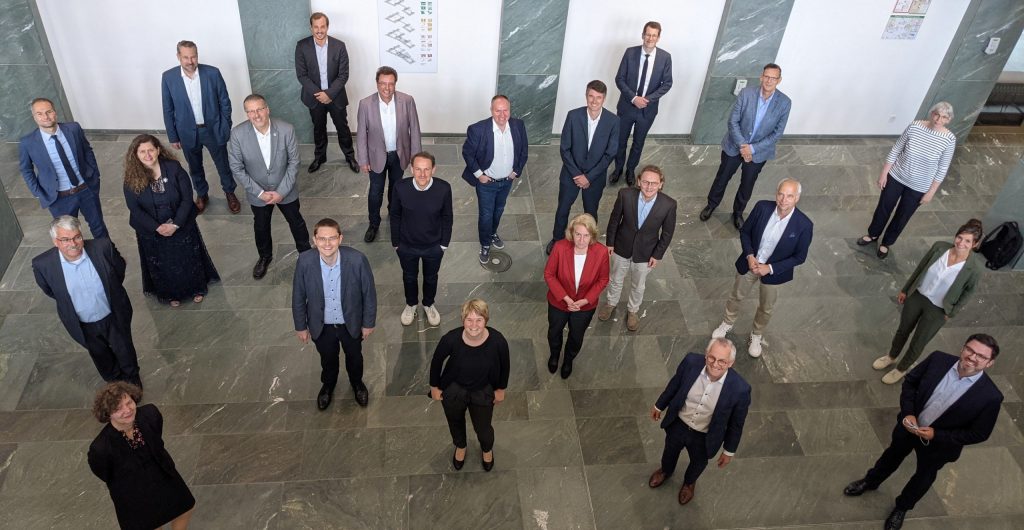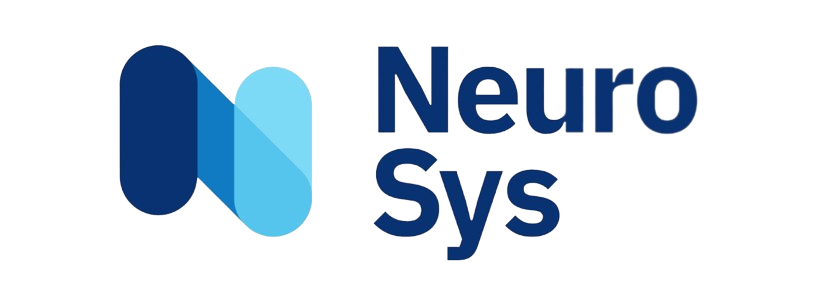
News
Events from us
Find out more about our upcoming events and stay up to date. Immerse yourself in the world of NeuroSys, discover exciting projects and meet us in person at seminars, workshops and events. Take the opportunity to exchange ideas with us and deepen your knowledge on various relevant topics. Here you will find all information about our current events and networking opportunities.
Seminar
Anwendungen des maschinellen Lernens finden Einzug in unseren Alltag und bieten für das Gesundheitswesen eine Chance auf verbesserte Diagnosen und Behandlungen. Innerhalb des Projekts D4 wird an einem Reinforcement Learning Controller zur Blutzuckerregulierung bei Typ 1 Diabetespatienten geforscht. Eine künstliche Bauchspeicheldrüse kann Patienten durch die automatisierte Blutzuckerkontrolle entlassten und Blutzuckerschwankungen reduzieren. Reinforcement Learning bietet die Möglichkeit einer Closed-Loop Kontrolle mit personalisierter Insulinverabreichungen basierend auf Echtzeitdaten des Blutzuckerspiegels auf dessen Veränderungen frühzeitig reagiert werden kann. Die Forschung erfolgt in Simulationen mit virtuellen Patienten. Die Anwendung zeigt sowohl Chancen als auch Grenzen von Reinforcement Learning, komplexe medizinische Entscheidungsprozesse zu verbessern und individuelle Gesundheitsziele zu erreichen.
Beim maschinellen Lernen, einem Teilgebiet der künstlichen Intelligenz, werden Lösungswege nicht explizit programmiert, sondern anhand von Daten mit statistischen Methoden gelernt. Reinforcement Learning (bestärkendes Lernen) ist eine Form des maschinellen Lernens, bei der ein Agent durch Interaktion mit seiner Umgebung Entscheidungen trifft. Das Lernen erfolgt hierbei durch einen Trail-and-Error-Ansatz und dem Versuch der Maximierung einer Belohnung. Policy Iteration ist ein Verfahren der dynamischen Programmierung, bei dem der Agent schrittweise seine Entscheidungsstrategie verbessert, indem er abwechselnd seine Policy bewertet und basierend auf der Bewertung verbessert. In diesem Vortrag soll am Beispiel Policy Iteration vermittelt werden, wie die mathematischen Konzepte hinter Reinforcement Learning funktioniert.
Wie kann der Agent eigenständig lernen bessere Entscheidungen zu treffen?
Der Vortrag wird in englischer Sprache gehalten.
Datum: 10.06.2024, 16:30–18:30
Ort: Leonardo Seminar Raum, Human Technology Centre (HumTec), Theaterplatz. 14, 52062 Aachen Referent: Miriam Chlumsky-Harttmann M.Sc.
10.06.2024
Conference
Invitation to a very special conference: the International Conference on Neuromorphic Computing and Engineering (ICNCE) where we bring together three important disciplines with large communities:
- The Neurosciences, in particular computational neuroscience and brain research,
- The Electrical Engineering & Information Technology in the context of the Neuromorphic computingwith a particular focus on innovative, energy-efficient memristive components and circuits, and
- The Computer sciencein particular with regard to artificial intelligencetheir possible applications and the associated economic and ethical issues.
The ICNCE-2024 is organised by the structural change project NEUROTEC and the future cluster NeuroSys. The co-chairs of the conference represent the participating disciplines:
- Markus Diesmann, Computational Systems and Neuroscience, Research Center Jülich
- Bastian Leibe, Computer Vision, RWTH Aachen University & AI Center
- Max Lemme, Electronic Devices, RWTH Aachen University & AMO GmbH
- Rainer Waser, Electronic Materials, RWTH Aachen University & Research Center Jülich
We are proud that ICNCE-2024 will bring together high-calibre international speakers from all the disciplines involved, such as from the list of invited speakers is visible. We will ensure that the speakers' presentations will be understandable and inspiring for a wide audience, and transcend the boundaries of individual specialisms.
Dates: 03.-06.06.2024
Ort: Eurogress, Aachen
Please feel free to contact us if you have any questions: info@icnce-2024.de
03.-06. 06. 2024
Transfer event
Neuromorphic computing is a technology of fascinating possibilities that enables unimagined AI applications with more energy-efficient computing.
At the same time, there are still many open questions that we would like to answer together. Specifically: What needs to be done to put this innovation into practice? This is precisely the subject of our workshop.
We all face a challenging task: How can this visionary technology gain a foothold in the Aachen region and the Rhenish mining area? What conditions need to be created? What can science, business, politics and society contribute?
We are breaking new ground together and are looking forward to addressing the challenges that come with it.
Let's do this together!
Date: 23 February 2024, 10:00-14:30
Location: SuperC of the RWTH Aachen, Templergraben 57, 52062 Aachen
23. 02. 2024
Seminar
NeuroSys Status Seminar 2024
Update: LinkedIn Post about the #NeuroSysStatusSeminar2024
All partners of the NeuroSys Clusters4Future from research and industry as well as all advisory board members are invited to participate in the NeuroSys status seminar, the strategy mapping workshop and the advisory board meeting.
Die Projektergebnisse werden von Koordinator Prof. Max Lemme und den Projektleitern Prof. Rainer Waser, Prof. Jeremy Witzens, Prof. Tobias Gemmeke, Prof. Bastian Leibe und Prof. Peter Letmathe vorgestellt und zeigen den großen wissenschaftlichen Fortschritt.
Date: 22.-23.01.2024
Location: SuperC of the RWTH Aachen, Templergraben 57, 52062 Aachen
22.-23. 01. 2024
Seminar
In the fascinating world of scalable photonic neuromorphic circuits, choosing the right materials is key to unlocking the energy-efficient and high-performance potential. This talk offers an accessible journey into the world of chalcogenides - versatile materials that have the potential to help shape the devices of the digital future. Join us as we explore how these materials could become the heroes of low-power remanent phase shifters. A remanent, non-volatile phase shifter only requires energy to change its settings, not to maintain them. This saves power and makes it more efficient than a conventional phase shifter, which constantly requires energy to maintain its conguration. We will look at their unique properties, explain the complicated interaction between light and materials and show how these innovations bridge the gap between physics and electrical engineering. Whether you are a novice or a seasoned enthusiast, this talk promises to illuminate the exciting possibilities at the intersection of photonics and smart materials.
Translated with www.DeepL.com/Translator (free version)
Date: 28.11.2023, 16:00–18:00
Location: Leonardo Seminar Room, Human Technology Centre (HumTec), Theaterplatz. 14, 52062 Aachen Referent: Felix Hoff M.Sc
28. 11. 2023
Workshop
1st Ethics Workshop
On Wednesday 17 October, a first ethics workshop will take place under the direction of Project E.3 with members of Project D: Topics will include aspects of research responsibility, the data basis of neuromorphically supported decision-making and the autonomy of addressees. Among other things, Project D is researching applications of neuromorphic technologies that can be used in the medical field. Here, the autonomy of users is not only extremely sensitive, it can also be influenced by the data basis used. This concise workshop will deal with selected ethical dimensions of the research of the relevant projects in the cluster and contribute to the interdisciplinary exchange in the future cluster. Translated with www.DeepL.com/Translator (free version)
The events are the prelude to additional workshops in the future, to which other members of the cluster will be invited.
Date: 17.10.2023
Management and development: Prof Dr Saskia Nagel, Dr Frieder Bögner
17. 10. 2023
Networking
2nd Jülich-Aachen Neuromorphic Computing Day
Date: 30.08.2023, 08:30-18:00
Location: Research Centre Jülich
Please feel free to contact us if you have any questions: neurosys@eld.rwth-aachen.de
30. 08. 2023
Seminar
One method of understanding physiological and anatomical brain data is to model it mathematically or as a computer program. The scientific field that pursues this approach is called computational neuroscience. This course provides a brief tour of computational neuroscience methods, as a cycle from mathematical modelling of biological data, the translation of these models into machine models and their simulation, to the validation of the simulation results using biological data. The abstractions that will be discussed include the connectivity of biologically inspired neural network models, synaptic transmission, plasticity and heteroginity of parameters. The tour also includes a hands-on part where participants can try out the neuronal simulator NEST and an introduction to high-performance computing methods to simulate large-scale firing models. This session will end with an interactive discussion aimed at bridging gaps between computational neuroscience and neuromorphic hardware development. Possible topics for this discussion would be: on the one hand, what information, e.g. about biological parameters, mechanisms and network architectures, do neuromorphic hardware developers need from computational neuroscientists to design and refine their hardware, and on the other hand, what information about neuromorphic hardware limitations should computational neuroscientists be aware of if they want to use it as a substrate?
Translated with www.DeepL.com/Translator (free version)
Date: 01.06.2023, 16:00–18:00Uhr
Location: Leonardo Seminar Room, Human Technology Centre (HumTec), Theaterplatz. 14, 52062 Aachen
Speaker: Agnes Korcsak-Gorzo
The seminar is co-organised by: Mareike Smolka, Frieder Bögner, Philipp Neudert (HumTec); Thorsten Wahlbrink, Tobias Abel (AMO GmbH); Lukas Voelkel, Dennis Braun (ELD). If you have any questions, please contact mareike.smolka@humtec.rwth- aachen.de.
01. 06. 2023
Event
Semiconductors for AI in the Rhenish mining area -
Paving the way from research to application in the future high-tech region
The event is being organised jointly with the NEUROSYS future cluster, coordinated by Prof. Max Lemme, RWTH Aachen and the project NEUROTEC "Neuro-inspired artificial intelligence technologies", coordinated by Prof. Rainer Waser, Research Center Jülich.
Date: 05.05.2023
Location: SuperC (RWTH Aachen), Templergraben 57, 52062 Aachen
Preliminary agenda:
- 14:30 – Welcome and introduction
- 14:45 – AI users in the Rhineland region present themselves with Next Practices applications
- 15:15 — Questions and discussion
- 15:30 — Cutting-edge research in semiconductor technology — AI of tomorrow and the transfer to the region • 16:00 — Discussion on the keynote speeches
- 16:30 — Panel discussion: Transfer of research results into the labour market
- 17:00 — Closing with networking
You can reach us at the telephone number +49 2461 70396-33 and by e-mail at nicole.kolster@rheinisches-revier.de .
05. 05. 2023
Seminar
Applied ethics, research responsibility and perspectives for an ethics compass
In applied ethics, ethical values, permissions and regulations are not merely asserted. Rather, it involves the search for arguments and conceptual differentiations in order to understand and judge ethically relevant practices. These practices can be research activities, for example regarding the development of technical devices whose concrete applications, benefits and risks are uncertain. In this lecture, I will firstly introduce some basic characteristics of applied ethics and will also try to explain selected methods for an interdisciplinary forum. Secondly, in the context of the NeuroSys Cluster, two topics of research activities are of particular importance for applied ethics: (1) This is the concept and scope of research responsibility. Why are researchers morally responsible for the social dimensions of the research process and the research results, to what extent are they responsible and for what exactly? (2) What are the prospects for an Ethics Compass for NeuroSys and how should it relate to the concept of research responsibility? This lecture is not a 'crash course' in applied ethics in neuromorphic computing, but rather an invitation to an interdisciplinary exchange between applied ethics and, in particular, the technical disciplines in the cluster. In other words, the lecture will not develop definitive answers to the two topics mentioned, but rather suggestions on how to formulate more specific questions in this area in the first place.
Translated with www.DeepL.com/Translator (free version)
Date: 23.03.2023, 16:00–18:00
Location: Leonardo Seminar Room, Human Technology Centre (HumTec), Theaterplatz. 14, 52062 Aachen
Speaker: Frieder Bögner
If you have any questions, please contact mareike.smolka@humtec.rwth-aachen.de.
23. 03. 2023
Seminar
NeuroSys status seminar
More than 80 researchers attended the Advances in NeuroSys — General Assembly 2023. A productive meeting was held on the scientific results and project progress, with a discussion on future work planning.
Date: 02.03.2023
Location: ICT-Cubes, RWTH-Aachen University, 52062 Aachen
02. 03. 2023
Seminar
Was ist ein Memristor und warum brauchen wir ihn für neuromorphes Computing?
In this NeuroSys Academy provides an overview of memristors. Memristors are devices that have the ability to store previous states. The lecture will cover the history of memristors, different approaches to their fabrication and their potential applications. Finally, the lecture will cover current discussions on the properties required for the large-scale integration of memristors into neuromorphic hardware.
Date: 12.01.2023, 16:00-18:00
Location: Leonardo Seminar Room, Human Technology Centre (HumTec), Theaterstr. 14, 52062 Aachen
Speaker: Dr. Alwin Daus
If you have any questions, please contact mareike.smolka@humtec.rwth-aachen.de.
